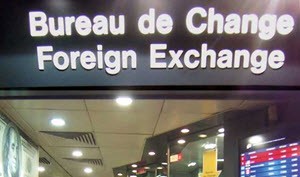Examples of large players on the Forex market:
- National central banks
- Other large banks (interbank market level)
- Large funds and insurance companies (including retirement funds and hedge funds)
- The retail currency trade and its market makers
- Bureaux de change
- Money transfer services (including remittance services)
- Companies that pay bills in foreign currency
The interbank market
Large banks are continuously buying and selling currencies at the interbank market. This is one of the reasons why the forex market has such great liquidity, especially for major currencies such as EUR, USD, JPY and GBP. Roughly 40% of all foreign exchange trade in the world takes place on the interbank market level, and it is not unusual for large banks to purchase several billion units of currency with a single order.
 At the interbank market level, the spread between asking price and bid price is usually extremely small – much smaller than what we are used to see at lower levels of the forex market.
At the interbank market level, the spread between asking price and bid price is usually extremely small – much smaller than what we are used to see at lower levels of the forex market.
In addition to basic spot market purchases, there is also a lot of trade in Forward-contracts taking place on the interbank market. Another important part of the interbank market are SWIFT transactions (SWIFT = Society for World-Wide Interbank Financial Telecommunications).
Two examples of large electronic broker platforms utilized by large banks for forex trade are Thomson Reuters Eikon and Electronic Broking Services (EBS). At the time of writing, more than one thousand large banks are connected to either one or both of these platforms.
Examples of large banks that trade currencies at the interbank market level are Barclays Investment Bank (UK), HSBC (UK), Royal Bank of Scotland (UK), Citi (USA), JP Morgan (USA), Bank of America Merrill Lynch (USA), Goldman Sachs (USA), Deutsche Bank (Germany), UBS AG (Switzerland), and BNP Paribas (France).
National central banks
National central banks holds a somewhat special position on the forex market, since they often influence currency rates without actually buying or selling any currency. Some national central banks will do major buys or sales, but it is much more common for national central banks to adjust national interest rates in an attempt to influence the price of their own currency in relation to foreign currencies. Even national central banks that hardly ever make significant purchases or sales of currency are seen as major players on the forex market, since they can actively influence the price of currencies.
Funds
- A fund can purchase currency in order to pay for an asset that the fund wishes to acquire.
- A fund can directly engage in forex trading with the goal of making a profit for the fund.
- Currency trade can be a way of hedging (managing financial risk) for a fund.
Retail currency trade
During recent years, retail currency trade has become an important aspect of the fx market. Thank’s to internet, it is now possible for almost anyone to engage in currency trade – even on a hobby level. There are numerous fx brokers available online, and there are also companies where you can carry out fx trade that will act as “market makers” instead of simply being brokers.
When we look at the entire fx market, retail currency trade is still a pretty small piece of the pie, but it is a piece that is growing quickly with each year.
Bureaux de change
 A bureau de change (plular: bureaux de change) is an exchange facility where you can exchange physical currency. Today, it is normally also possible to use a credit/debit card to withdraw cash through a bureau de change, and some facilities will also have other options available for their clients, e.g. the possibility of depositing physical money in one currency and have them converted into another currency and deposited directly into a bank account.
A bureau de change (plular: bureaux de change) is an exchange facility where you can exchange physical currency. Today, it is normally also possible to use a credit/debit card to withdraw cash through a bureau de change, and some facilities will also have other options available for their clients, e.g. the possibility of depositing physical money in one currency and have them converted into another currency and deposited directly into a bank account.
The users of bureaux de change are normally not forex speculators, but people who need currency for everyday transactions.
Remittance and other money transfers
Money transfer businesses are available for the transfer of money from one country to another. They will typically accept even very small transactions.
Money transfer businesses can be significant players on the fx market even when they only work with small and mid-sized transactions, since the sheer volume of transactions means that they are turning over huge amounts each day.
One important aspect of the money transfer sphere is the transfer of so called remittances; money sent to family or other dependents from someone working abroad. In 2014, the equivalent of over 580 billion USD were sent as remittances, of which approximately 436 billion USD went to recipients located in developing countries.
Examples of major remittance businesses are Western Union and UAE Exchange. In many countries, remittance offices will also function as bureaux the change.
Companies that pay bills in foreign currency
A company can have money arriving in one currency, held in another, and paid out in a third. Some companies even have to make payments in several different currencies on a regular basis, e.g. because they have staff to pay in several different countries and/or are importing goods from several different parts of the world.
Even comparatively small purchases of currency carried out by companies that aren’t primarily forex trading companies can be of interest to the fx trader, since the combined flow of currency between companies can serve as an indicator of where the fx market is heading. A sudden outpour of resources from a certain region can for instance be a sign that political instability in the region are causing companies to divest, and this can eventually escalate into a situation where the national currency drops like a stone on the fx market.
This article was last updated on: January 3, 2016
